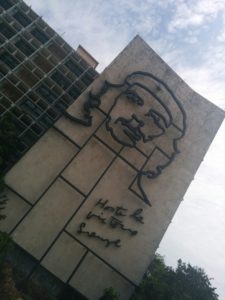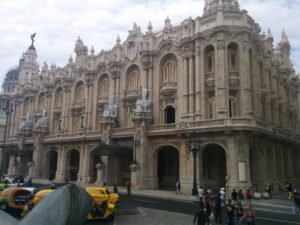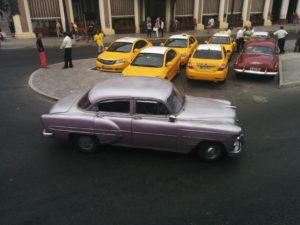This post is also available in: English
Haitian and Cuban history are intertwined.
Haitian and Cuban history are intertwined. Around the time of the Haitian Revolution, many French slave-owners in Haiti fled to Cuba with some of their slaves in tow. During the first half of the 1900s, many Haitian migrant workers travelled to Cuba to work in the sugar cane plantations (mostly) and other industries.
For my family, this history is personal. My maternal grandmother was born in 1930 in Camaguey to Haitian migrant workers. She came to Haiti as a toddler with some of her older siblings and her mother. Like other descendants of Haitian migrant workers, some of my Grann’s older siblings stayed in Cuba. Our family lost touch with them. My maternal grandfather’s dad was a migrant worker as well.
Cuba has been on my travel list for quite a while. I’ve always been eager to visit my Grann’s birthplace. And I’ve had always dreamed of reconnecting with my long lost second cousins.
Che, Camillo and Fidel
By the time I finished primary school, I knew about the Revolution and its leaders—well, as much as an 11 year-old can understand. I was too young then to fully understand what it meant.
Portraits of Ernesto “Che” Guevara and Camillo Cienfuegos are everywhere in Havana. The words “Viva Cuba Libre!” and “Viva la revolución” can also be seen often. I even saw Hugo Chavez and other leftist leaders painted on a few walls. Strangely, I saw very few pictures of Fidel Castro in Cuba.
The Cuban Revolution is ever so present. There’s an entire museum dedicated to this period. While the display is modest, they did a pretty good job at telling the full story.
Haiti needs a new revolution
In high school, I read L’espace d’un cillement (J.S. Alexis, 1959) again. My Haitian Lit teacher asked me to consider the underlying messages: La Niña Estrellita could easily be Cuba and El Caucho, Haiti. Then he pointed out how the roles had since been reversed.
One thing that struck me was how well educated people were, from the cab driver to the waitress to the tourist bureau clerk.
I had the chance to chat with people of various ages. They seemed to have a clear notion of the key issues at stake in their country and are able to articulate their vision for the future. They are proud of their past, but they focus on the future. None of the people I met denied the good the Revolution brought (education, health system, etc.). They talked about the embargo, but they didn’t use it as a crutch to justify the nation’s shortcomings.
A man my age drove us from Havana to Varadero. We had the most interesting conversation. My friends and I were in awe with the road, the landscape and everything we saw. We kept on saying how lucky they were to have all of this, and we talked about all that Haiti was lacking in comparison. Our driver politely asked us to stop. He wanted us to focus instead on where Cuba could go. For him, being content with what he had was not an option. He knew there was a different world out there, and he wanted Cuba to be a part of it.
From our host in Havana came the wisest words: Haití necesita otra revolución. And he is right. Falling back on 1804 every single time we want to remind ourselves of our greatness is getting, well, old. “What have you [collectively] done lately?” he asked. I still don’t have an answer. (If you do, please share.) He mentioned how, together, they got through famine in the 1990s. Around the same time a 3-year embargo crippled our economy.
Not a single person asked us for charity. What we discovered was a people who hustle. Hard.
Our host asked my friend to exchange his brand new shoes for a box of Cuban cigars. They bargained for a good 15 minutes. A cute little boy (no more than 6) offered me one Mentos in exchange for some of my Pringles. Being the sucker for cute kids that I am, I decided to give him the Pringles and not take his Mentos. He was adamant that I take my due. Which I did, partly because I didn’t want to embarrass him, but mostly because my limited Spanish didn’t allow me to convince him otherwise.
We didn’t make it to Camaguey. We were unable to pick up the car we had booked weeks prior our arrival. We learned the hard way that, in Cuba, things could be difficult.
See, their system is far from being perfect. But one has to respect their resilience and their ability to make do with what they have.
I’m usually a chatterbox; but, in Cuba, I listened a lot. I observed and got inspired. I came back with more: purpose, a deeper respect for the people of Cuba, and dreams of a new Haitian Revolution.
Going to Cuba?
- Make sure to go to Havana or Santiago.
- In Havana, take the tour bus; you’ll really get a good overview of the city.
- The Canadian dollar has more value than the US dollar.
- Cuba has two currencies. Buy some of both at the airport.



